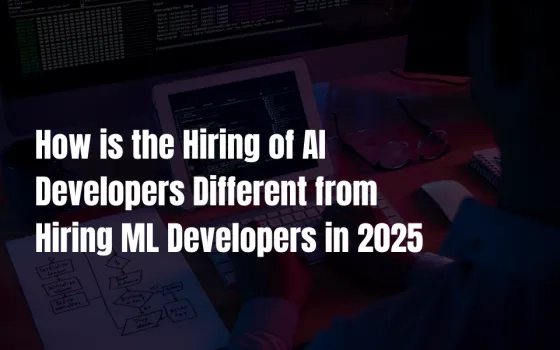Artificial Intelligence (AI) and Machine Learning (ML) are at the heart of digital transformation, shaping how businesses operate, innovate, and deliver value. For CXOs, CTOs, and technology leaders, the ability to hire the right talent is a strategic decision that directly influences competitiveness and growth. Yet, the distinction between hiring AI developers and ML developers is often blurred. While the two roles are interconnected, their expertise, responsibilities, and contributions differ in ways that are critical for enterprises to understand.
The process of building a high-performing team involves more than simply acquiring technical skills, such as looking to hire Python developers. It requires a precise understanding of what each role brings to the table, how they align with organizational goals, and the type of talent that ensures scalable, intelligent solutions. In this context, understanding the differences between hiring AI and ML developers is crucial for aligning resources with business outcomes.
Understanding the Core Difference
AI developers are focused on designing, developing, and deploying intelligent systems capable of simulating human-like decision-making, reasoning, and problem-solving. Their expertise spans a broad spectrum, from natural language processing and computer vision to robotics and cognitive automation. By contrast, ML developers specialize in creating algorithms and models that enable machines to learn from data, identify patterns, and make predictions without explicit programming.
While AI is a broader discipline that encompasses multiple fields, machine learning is a subset explicitly focused on learning from data. This distinction directly affects how organizations recruit talent. Hiring an AI developer means looking for professionals who can architect end-to-end intelligent systems, whereas hiring an ML developer requires identifying experts capable of creating and optimizing learning models that power those systems.
Skills and Technical Expertise
When hiring AI developers, organizations prioritize knowledge of frameworks, APIs, and tools that enable the creation of intelligent applications. Proficiency in deep learning libraries, natural language processing, and neural network design is essential. AI developers must also be adept at integrating multiple data sources, applying reasoning methods, and ensuring solutions align with business logic.
On the other hand, ML developers are recruited for their ability to work with data at scale. This includes skills in statistical modeling, feature engineering, and training algorithms. They must understand supervised and unsupervised learning, reinforcement learning, and the nuances of deploying predictive models. Their expertise often extends to data preprocessing and optimization techniques that improve the performance and accuracy of models.
While both roles require strong programming knowledge, ML developers are often expected to demonstrate deep proficiency in Python. Enterprises seeking to strengthen their ML teams usually choose to hire Python developers who bring not only coding expertise but also familiarity with data science libraries such as NumPy, pandas, and scikit-learn. This highlights how technical priorities differ when building AI and ML teams.
Application Scope in Enterprises
For enterprises, the hiring decision often hinges on the scope of application. AI developers play a crucial role in enabling organizations to deploy intelligent platforms that integrate multiple functionalities, including chatbots with NLP, autonomous decision-making engines, and large-scale computer vision solutions in manufacturing. These roles demand a holistic approach that bridges innovation, scalability, and business intelligence.
ML developers, however, are more critical in projects where data-driven predictions are the focal point. Whether forecasting demand in supply chain operations, building fraud detection systems in finance, or designing recommendation engines in retail, ML developers deliver the predictive backbone that drives operational efficiency. In this way, both roles complement each other but cater to different layers of enterprise requirements.
AI vs ML Hiring Impact Across Industries
The impact of hiring AI developers versus ML developers becomes even clearer when examined through an industry lens. We can discuss the various industries' impact here.
Healthcare
In healthcare, AI developers play a crucial role in developing diagnostic systems, medical imaging solutions, and intelligent assistants that replicate clinical reasoning. Meanwhile, ML developers focus on creating predictive models for disease progression, patient readmissions, and personalized treatment recommendations, leveraging large datasets.
FinTech
In the financial sector, AI developers contribute by creating fraud detection engines, conversational banking assistants, and autonomous trading bots that enhance customer interactions and risk visibility. ML developers, in contrast, specialize in credit scoring, anomaly detection, and market trend forecasting, ensuring that decisions are precise and data-driven in highly regulated environments.
Retail and eCommerce
For retail and eCommerce, AI developers enable personalized shopping through advanced recommendation engines, AR-powered customer experiences, and engagement platforms that deliver tailored interactions at scale. ML developers strengthen these initiatives by designing demand forecasting models, dynamic pricing systems, and churn prediction solutions that help optimize supply chains and marketing strategies.
Manufacturing
In manufacturing, AI developers design vision-based quality inspection systems and robotic process automation platforms that streamline production efficiency. ML developers add value by creating predictive maintenance models, supply chain forecasting tools, and yield optimization frameworks that reduce downtime and operational costs.
Telecom
Within the telecom industry, AI developers focus on building intelligent network management systems, customer support chatbots, and AI-driven orchestration platforms that elevate service delivery. ML developers complement these efforts by engineering traffic prediction algorithms, subscriber behavior models, and churn reduction mechanisms that drive retention and network optimization.
Across industries, the distinction is clear: AI developers enable enterprises to build comprehensive intelligent platforms, while ML developers offer the predictive depth and optimization capabilities that ensure these platforms operate with measurable accuracy and efficiency.
Hiring Challenges and Evaluation
The hiring process for AI developers often revolves around assessing creativity, problem-solving skills, and the ability to conceptualize intelligent workflows. Employers look for experience in integrating AI into complex business processes, as well as familiarity with ethical AI practices and governance models.
The challenge lies in identifying professionals who not only understand the technical side but can also contextualize AI solutions for business advantage.
For ML developers, hiring decisions focus more on mathematical rigor, statistical acumen, and proficiency with large-scale datasets. Recruiters evaluate candidates based on their ability to preprocess noisy data, train efficient models, and fine-tune algorithms for production environments.
The primary challenge here is distinguishing between general data science expertise and specialized ML development skills. Enterprises often collaborate with a Python software development company to streamline recruitment and secure access to vetted ML talent with proven track records.
Strategic Value for the Enterprise
AI developers contribute by building systems that transform how enterprises engage customers, automate processes, and innovate products. Their role is inherently strategic, as they enable businesses to differentiate themselves in crowded markets through intelligent experiences and capabilities that competitors cannot easily replicate.
ML developers, while equally critical, serve as the executional force behind data-driven insights. They ensure that predictions are reliable, models remain accurate, and data pipelines are scalable. Their value is in empowering organizations to make informed decisions and optimize operations with measurable outcomes. Together, AI and ML teams form the foundation of intelligent enterprises, but understanding their distinct value ensures organizations deploy resources more effectively.
The Role of Python in Hiring Decisions
Python has emerged as the lingua franca of both AI and ML development, making it central to recruitment strategies. Enterprises seeking to enhance their AI capabilities often look for developers fluent in TensorFlow, PyTorch, and other advanced deep learning frameworks, all of which are Python-based. Similarly, ML developers are expected to build models using Python’s rich ecosystem of data science libraries.
This convergence around Python has led enterprises to hire Python developers for enterprises building AI and ML capabilities simultaneously. Python developers bring versatility, allowing them to contribute to both AI and ML projects, while specialized expertise determines how they are deployed. Collaborating with a trusted Python software development company ensures that enterprises have access to professionals who can scale both AI and ML initiatives with efficiency.
Alignment with Business Goals
Ultimately, the hiring of AI developers versus ML developers is not about choosing one over the other but about aligning each role with the enterprise vision. For CXOs, the key lies in identifying whether the organization needs system-level intelligence powered by AI or predictive capabilities powered by ML. Hiring strategies must be guided by whether the business is focused on building intelligent products, optimizing internal operations, or creating customer-centric platforms.
The success of digital transformation initiatives depends not only on technical skills but also on strategic alignment. AI developers bring the vision of intelligent systems to life, while ML developers provide the predictive accuracy that ensures these systems are effective. Hiring decisions should therefore be driven by long-term goals rather than short-term needs, ensuring the enterprise builds a workforce capable of adapting to future demands.
Conclusion
As enterprises navigate 2025, the distinction between AI and ML developers remains vital for making informed hiring decisions. While both contribute to the development of intelligent solutions, their expertise, responsibilities, and strategic value differ significantly. AI developers focus on architecting holistic systems that emulate human intelligence, whereas ML developers specialize in building the predictive models that power those systems.
For CXOs and technology leaders, recognizing these differences ensures that hiring strategies align with business priorities. Whether the goal is to create intelligent customer engagement platforms, predictive analytics engines, or end-to-end AI ecosystems, the right talent mix is essential.
By choosing to hire Python developers and collaborating with a reputable Python software development company, enterprises can bridge the gap between AI innovation and ML precision. These building teams not only address current needs but also prepare the organization for future challenges.

















